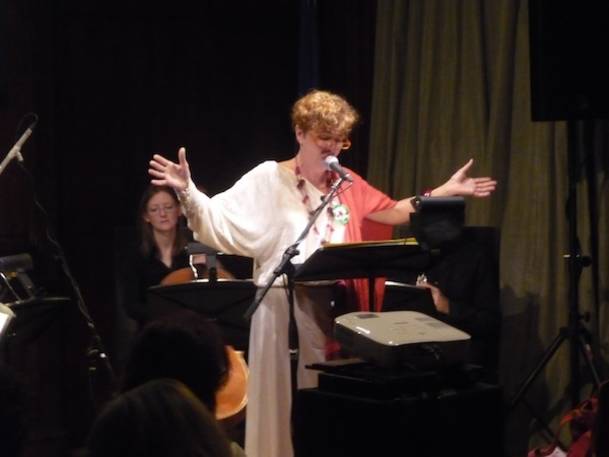


Giosuè Carducci [2]was one of the most important Italian poets of the decades that immediately followed the unification. He was a defendor of classical culture, of national identity and of the ideas of freedom, justice and progress stated during the Risorgimento. His indomitable spirit earned him the nickname 'leone maremmano' (lion of the Maremma). The second event of the 'Divinamente' festival held at the Italian Cultural Institute [3]of New York was dedicated to the reading of his most important works, alongside a recounting of the events of his life: his early years in Maremma, his stays in Florence and Bologna, his political commitments, family tragedies, and his love affairs. The reading was given by actress Pamela Villoresi, accompanied by new music by Luciano Vavolo at the violin, guitar, cello, clarinet, flute and keyboards.
Carducci refused the points of Romanticism, because he saw them too far away from Italian culture. He was a patriot, for his mother land, for the working man, like the themes of the Macchiaioli, a group of Italian painters of those years who used spots of colors and chiaroscuro. Their paintings were projected during the reading of poems such as “Traversando la Maremma Toscana” or “San Martino”, with the famous opening lines “La nebbia agli irti colli, piovigginando sale e sotto il maestrale urla e biancheggia il mar”, or the poem “Il bove” with the salute to the ox with the words “T'amo, o pio bove”. This way the New York public was able to take a leap into the life of the Tuscan countryside of the late 19th century, and the themes and languages the have been lost in contemporary Italy, but that are important to remember because they built the culture of our country in the years of the unification.
Carducci was so tied to his land that, while making a toast with some friends in Castagneto, he declared “Of what heart I would remain, my cypresses”. His first poem was written on a May evening in 1848, about the sounds and smells of the nocturnal countryside. Many of his verses described the sweetness of his grandmother Lucia in contrast with the harshness of his father, who punished the animals with whom the young poet played with during his breaks from Latin. The paternal education was so rigid that many believe Carducci's brother not to have committed suicide but to have died after a violent fight with his father.
Describing his young years, Carducci said: “Forte e facil d'amor io m'intalento e il conversar m'e' carco”. Initially he was forced a religious education, but lost his faith and became anti-clerical and anti-Papacy. In 1863, with obvious provocative intentions, he published a “Hymn to Satan” in the Popolo di Bologna magazie, in which he described the need to free the human mind of every superstition. Only at an old age did he retrace a bit, commenting: “My soul laughs if I think I moved my poetry away from God”.
His civil commitment and political ideals were strong. He was Jacobian and libertarian, and after the unification supported the monarchy, as the only instrument to hold Italy together. Two days after the death of Garibaldi [4], on June 4, 1882, he dedicated a poem to the “blond head, superior to all the parties, because he first of all recognized himself as Italian and a defender of freedom”. In 1870 he wrote a sonnet dedicated to Mazzini [5] who “appears great and austere in movement” and in 1872 dedicated some verses to Goffredo Mameli [6], whose remains were exhumed with military and political honors.
The sudden family tragedies marked this solar poet: over a small number of years two cousins committed suicide, and both his brother and his two-year-old son Dante died. On November 4, 1870, he wrote the famous words for Dante “The tree toward which you held your childish hand...” in which he described the happy life of the child and the pain caused by his death.
He had many women, apart from his wife, to which he dedicated his poetry: queen Margherita, countess Pasolini, Annì Vivanti. He met Vivanti in Bologna in 1889, according to her wishes, for she had written some poems and wanted Carducci to read them; he fell in love with her.
The authenticity of his poetry brought to his receiving the Nobel Prize for literature in 1906. Due to his old age and bad health, the Prim Minister of Sweden presented the prize himself to “the bard of the highest ideals of planet Earth”.
The event ended with the reading of an excerpt of Canto 24 of Dante [7]'s Inferno about the injustices of Vanni Fucci, a poem by Carducci and one by Mario Luzi [8]. The three works are about honesty and abuse of power; in a comparison between the three authors it was demonstrated how in different centuries one can find the same topics, while possibly only changing the form of abuse.
Source URL: http://test.iitaly.org/magazine/focus/art-culture/article/remembering-giosue-carducci-lion-maremma
Links
[1] http://test.iitaly.org/files/copertinacarduccip10504421306436713jpg
[2] http://en.wikipedia.org/wiki/Giosu%C3%A8_Carducci
[3] http://www.iicnewyork.esteri.it/IIC_Newyork
[4] http://en.wikipedia.org/wiki/Giuseppe_Garibaldi
[5] http://en.wikipedia.org/wiki/Giuseppe_Mazzini
[6] http://en.wikipedia.org/wiki/Goffredo_Mameli
[7] http://en.wikipedia.org/wiki/Dante_Alighieri
[8] http://en.wikipedia.org/wiki/Mario_Luzi